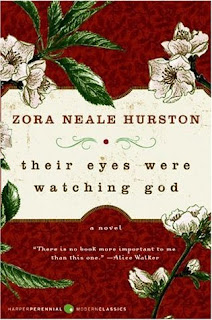Their Eyes Were Watching God
 Their Eyes Were Watching God, by Zora Neale Hurston
Their Eyes Were Watching God, by Zora Neale HurstonI don't quite know why it took me so long to read this lovely novel. For one thing, I didn't know what it was about, and American literature in general is a weak spot of mine (my husband read this in high school, but I took almost no American literature at all, so I'm always missing major things).
Janie Crawford is raised by her grandmother, who pressures her into marriage with a much older man in order to keep her safe. This fear-based decision is a disaster for Janie, and she soon leaves to marry Jody, a talker with big plans. They set up in Eatonville, a new town entirely run by black people. Jody impresses everyone and becomes the mayor, and for twenty years, Janie runs the town store while Jody runs everything else. He's not a bad mayor, but he oppresses and belittles Janie, and insists on living above everyone else. Janie has more interest in living with her neighbors than in having money or a fancy house, but she is never allowed to.
Widowed at forty, Janie is wealthy and courted for it, but she falls in love with the much younger Tea Cake and marries him. This has all the hallmarks of a disaster, but instead Janie is finally free to be herself and live as she wishes -- without worrying about social class. She and Tea Cake move to Florida and live in happy conviviality with other laborers, until a hurricane drives everyone out and begins the end of their life together. Afterwards, Janie goes back and tells her best friend her story, which is the frame of the novel.
Everyone talks in dialect; that is, the speech is all spelled as it should sound, which isn't fashionable today. I enjoyed being able to hear it so much better, though I also had to go more slowly than I'm used to. I felt like it was more immersive, partly because I did have to slow down and listen (so to speak).
When Their Eyes Were Watching God was published in 1937, it wasn't popular with the critics at all, who expected more protest, more highlighting of ugly realities. They thought it was escapist romance. Richard Wright hated it. But since then, readers have come to appreciate Janie as a woman who is independent and strong in herself, who goes after what she wants and finds it within the traditions of black community.
It's a beautiful novel and a must-read of American literature. I'm looking forward to reading more of Hurston's work.




Hahahaha, what? Escapist romance? I AM BAFFLED, to the point that I suspect my memories of this book. Isn't it, like, pretty dark in a lot of places? Janie goes through a lot before she meets her true love, and she also kinda goes through some stuff after she meets him. But it's been dog's ages since I read it, and maybe I'm misremembering.
ReplyDeleteNo, you are completely right. She goes through a lot! But Wright and co. worried that black life in the South was portrayed as relaxed, carefree, with quaint ways and lots of minstrelsy. They thought it wasn't serious enough and was written to make white people laugh. Wright said it "carries no theme, no message, no thought..." which is unrecognizable to me, but I guess they were just speaking different languages.
ReplyDelete